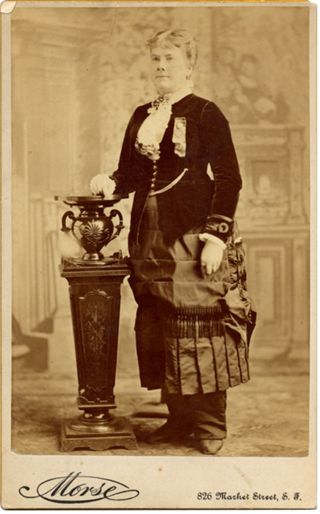From collection Candidates

While living in California, Marietta Stow, publisher of the Woman's Herald of Industry and Social Science Cooperator, immersed herself in party politics. She believed in the importance of the election of women to political office, and in 1880 accepted the Greenback Party's nomination for San Francisco School Director. In August 1881 she announced the formation of the Woman's Independent Political Party whose purpose was to prepare women for political life by giving them confidence-building experience. In 1882 she declared herself an independent candidate for governor of California. Stow used her newspaper to campaign, writing that she was "anti-monopoly, anti-ring, anti-Chinese," healthy and "unpickled with whiskey and tobacco." Although Stow endorsed many Greenback candidates, she continued to believe that women needed their own partisan organization. In 1884 she created the Equal Rights Party and searched for a woman willing to run for president. After Belva Lockwood agreed to be the party's candidate, Stow permitted herself to be nominated as her vice-presidential running mate. Lockwood ran a serious campaign with a full platform some aspects of which, such as her support for the rights of Chinese immigrants, appear to have differed from Stow's racist views. The campaign attracted national attention and provoked discussion of women's rights but won only a few thousand votes. As a young woman Stow taught school, married and quite possibly divorced, after which she supported herself as a public lecturer, speaking in behalf of shop girls and, later, orphaned daughters of Union soldiers. This work brought her to San Francisco where she met and married Joseph Stow, a member of the local elite, and became involved with woman suffrage. Stow's life changed dramatically in 1874 when her second husband died. According to Marietta, his sizeable estate was needlessly pushed into insolvency by self-interested executors, aided by the local probate court. Not a woman to suffer quietly, she summoned her reformer's zeal, attacking marital property and estate laws that she considered unjust because they impoverished women and denied them their fair share for contributions made to the marriage household. She lobbied state legislatures. In Washington, D.C. she introduced herself to attorney Belva Lockwood, who helped her write and lobby a federal marital property and estate reform proposal that was introduced in the House of Representatives in December 1879, shortly to die in committee. She used her newspaper for political purposes and to promote the philosophy of positivism, the new science of sociology, and the idea of industrial education for women. As editor, she encouraged the discussion of birth control, eugenics, a shorter work day, crime prevention, and the "mischief resulting from a purely masculine form of government in Church and State."






